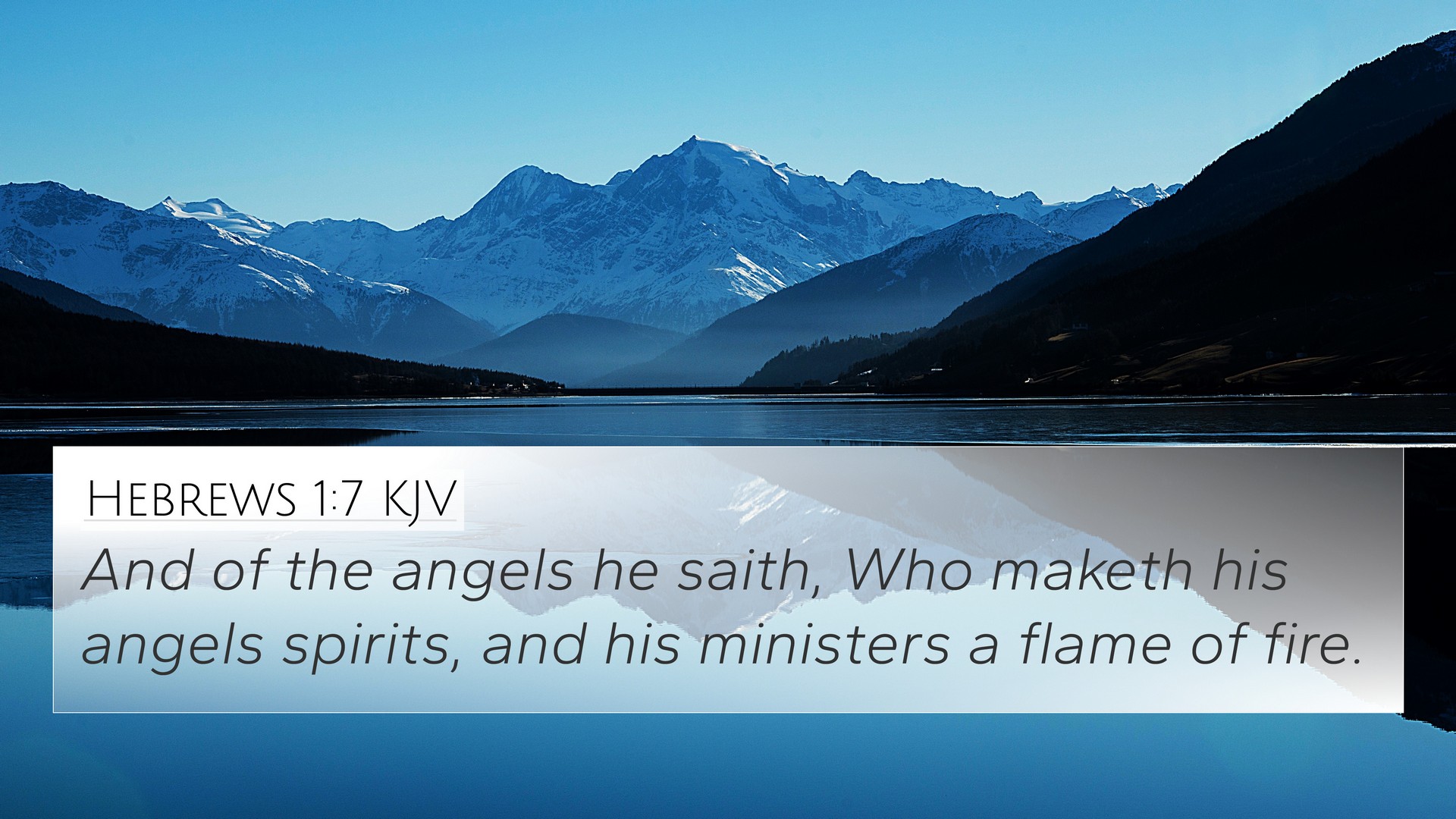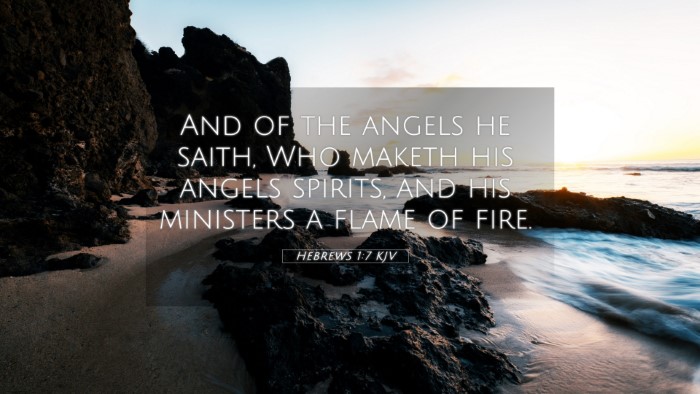Old Testament
Genesis Exodus Leviticus Numbers Deuteronomy Joshua Judges Ruth 1 Samuel 2 Samuel 1 Kings 2 Kings 1 Chronicles 2 Chronicles Ezra Nehemiah Esther Job Psalms Proverbs Ecclesiastes Song of Solomon Isaiah Jeremiah Lamentations Ezekiel Daniel Hosea Joel Amos Obadiah Jonah Micah Nahum Habakkuk Zephaniah Haggai Zechariah MalachiHebrews 1:7 Similar Verses
Hebrews 1:7 Cross References
And of the angels he saith, Who maketh his angels spirits, and his ministers a flame of fire.
Uncover the Rich Themes and Topics of This Bible Verse
Listed below are the Bible themes associated with Hebrews 1:7. We invite you to explore each theme to gain deeper insights into the Scriptures.
Hebrews 1:7 Cross Reference Verses
This section features a detailed cross-reference designed to enrich your understanding of the Scriptures. Below, you will find carefully selected verses that echo the themes and teachings related to Hebrews 1:7 KJV. Click on any image to explore detailed analyses of related Bible verses and uncover deeper theological insights.

Hebrews 1:14 (KJV) »
Are they not all ministering spirits, sent forth to minister for them who shall be heirs of salvation?
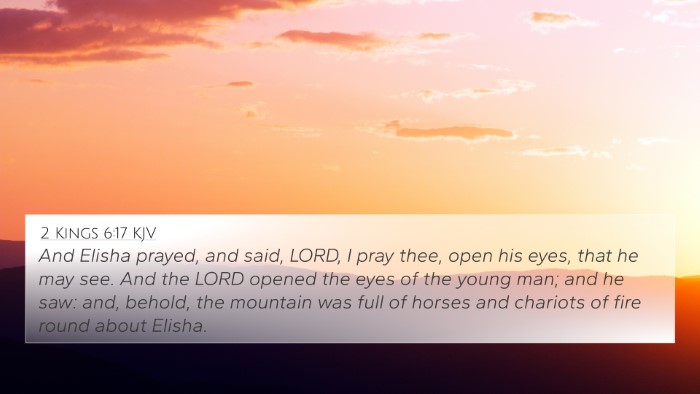
2 Kings 6:17 (KJV) »
And Elisha prayed, and said, LORD, I pray thee, open his eyes, that he may see. And the LORD opened the eyes of the young man; and he saw: and, behold, the mountain was full of horses and chariots of fire round about Elisha.
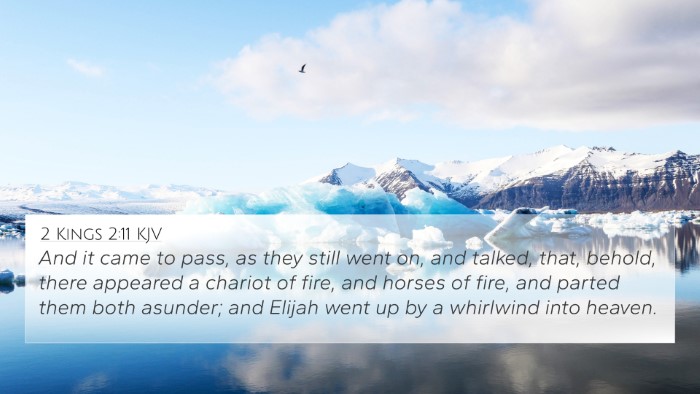
2 Kings 2:11 (KJV) »
And it came to pass, as they still went on, and talked, that, behold, there appeared a chariot of fire, and horses of fire, and parted them both asunder; and Elijah went up by a whirlwind into heaven.
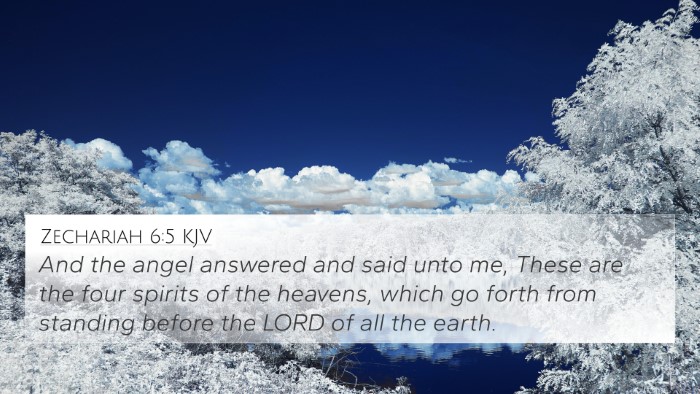
Zechariah 6:5 (KJV) »
And the angel answered and said unto me, These are the four spirits of the heavens, which go forth from standing before the LORD of all the earth.
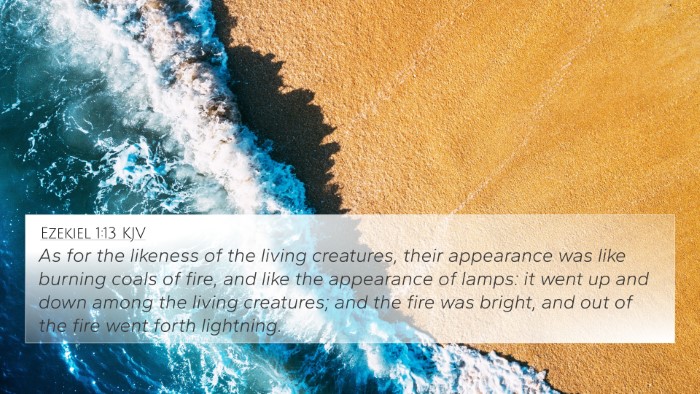
Ezekiel 1:13 (KJV) »
As for the likeness of the living creatures, their appearance was like burning coals of fire, and like the appearance of lamps: it went up and down among the living creatures; and the fire was bright, and out of the fire went forth lightning.

Daniel 7:10 (KJV) »
A fiery stream issued and came forth from before him: thousand thousands ministered unto him, and ten thousand times ten thousand stood before him: the judgment was set, and the books were opened.

Isaiah 6:2 (KJV) »
Above it stood the seraphims: each one had six wings; with twain he covered his face, and with twain he covered his feet, and with twain he did fly.
Hebrews 1:7 Verse Analysis and Similar Verses
Understanding Hebrews 1:7
Hebrews 1:7 states, "Of the angels he says, 'He makes his angels spirits, and his ministers a flame of fire.'" This verse introduces profound theological concepts regarding the nature of angels in comparison to the divine nature of Christ. Below, we explore its meaning through insights from various biblical commentaries.
Summary of Insights
This verse distinguishes between angels and the Son of God, highlighting angels as ministering spirits. Here is a breakdown of the key points derived from Public Domain Commentaries:
-
Matthew Henry:
Henry notes that angels are depicted as ministering spirits created by God for service. They act in a subordinate role and are often involved in delivering messages, offering protection, or executing God's judgments. Hebrews 1:7 serves to remind the readers that even celestial beings are not to be worshiped, as they are servants of God, unlike the Son, who is worthy of reverence.
-
Albert Barnes:
Barnes emphasizes the unique roles angels play, describing them as swift and powerful messengers. He points out that their comparison to "spirits" and "flames of fire" suggests their agility and their function to illuminate and purify. He further insists that this verse serves to exalt Christ's supremacy over all creation, showcasing the need for the faithful to acknowledge Christ's divinity.
-
Adam Clarke:
Clarke interprets this verse by asserting that angels are not beings to be elevated to a status equal to God or the Son. He elaborates on the metaphor of "flame of fire," suggesting it represents the purity and energy of angels in their ministerial duties. Clarke argues that the verse illustrates the distinction between God's created beings and His eternal Son, who reigns supreme.
Bible Verse Cross-References
To deepen understanding, here are some Bible verses that relate to Hebrews 1:7:
- Psalm 104:4: "He makes winds his messengers, flames of fire his servants." This verse parallels the depiction of angels in Hebrews 1:7 as agents of God's will.
- 2 Samuel 14:20: This passage implies that God works by using His servants, which can be likened to the roles angels play.
- Luke 1:19: The angel Gabriel's declaration as a messenger underlines their role as intermediaries between God and humanity.
- Revelation 7:11: Refers to angels standing before the throne of God, emphasizing their service and worship.
- Hebrews 1:14: Further elucidates angels as ministering spirits sent to serve those who will inherit salvation.
- Matthew 4:11: Describes angels ministering to Jesus after his temptation, showcasing their role in support of God’s plan.
- Genesis 19:1: The account of angels visiting Lot illustrates their protective and directive duties in human affairs.
Connections between Bible Verses
Thematic Bible verse connections can be established between Hebrews 1:7 and other relevant scriptures. This suggests a deeper, inter-Biblical dialogue regarding angelic beings and their divine commission.
Comparative Bible Verse Analysis
In conducting a cross-reference Bible study, one may observe that:
- Angels serve as intermediaries, resonating with themes found in both Old and New Testaments.
- The role of angels supports the idea of a divine hierarchy where Christ remains at the apex.
- Parallels exist between angels' ministerial roles and the functions of prophets in the Old Testament.
How to Use Bible Cross-References
Employing tools for Bible cross-referencing can enhance understanding:
- Utilize a Bible concordance to identify key terms and their related verses.
- Engage in cross-referencing Bible study methods to explore thematic ties between scriptures.
- Leverage comprehensive Bible cross-reference materials for deeper insights during sermon preparation.
Identifying Connections Between Old and New Testament
By studying how angels are depicted across the Testaments, one can discern a consistent portrayal that emphasizes their role as messengers of God's will, affirming the continuity of divine intent.
Conclusion
In summary, Hebrews 1:7 serves as a crucial verse for understanding the essential nature of angels in the economy of God. It highlights their function while reaffirming the supremacy of Christ. By engaging with cross-references and comparative analysis, one can gain a robust understanding of biblical themes revolving around heavenly beings and their relationship to the divine Son. This literary journey encourages deeper reflection on scripture and its interconnectedness.
